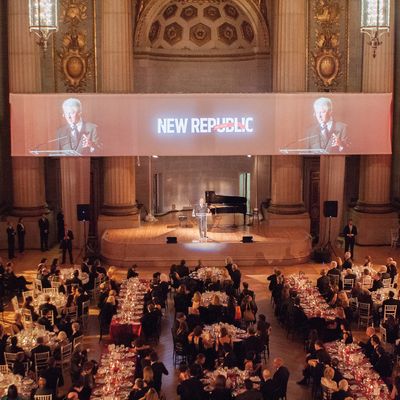
The New Republic’s 100th-anniversary gala, held at the austerely imperial, Depression-august Andrew W. Mellon Auditorium, felt a bit like a state funeral — if a bit after the fact — for the way small magazines with big ideas about the world and themselves used to operate. The D.C. grandees were present: Justice Ruth Bader Ginsburg, Nancy Pelosi, Chuck Schumer, Grover Norquist. Bill Clinton spoke, with his usual dogged, perambulating insight, for more than 40 minutes in the churchlike hall’s arched chancel, not so much about The New Republic, the magazine, but about the idea and potential of the not-so-new republic he used to run. (For what it’s worth, he declared our republic to be well positioned to innovate and succeed, at least for the next 20 years.) And while he praised TNR for providing context and not just feeding its readers evidence toward the opinions they already hold, he did so by telling the story of how his very liberal late mother-in-law used to watch Fox News to test herself against what the other side was thinking. “One of the things I hope The New Republic will do in the coming century of its life … is to actually make people debate an issue instead of labeling each other,” he said.
But how do you make thoughtfulness scalable (and maybe even profitable) in today’s urgent social-media vortex? Chris Hughes, the 30-year-old owner of the magazine, who bought it with his money from working with his college roommate Mark Zuckerberg on Facebook, is determined to keep up with the disruption-of-journalism era he had a hand in creating. This is the business The New Republic finds itself in. In his speech, he harkened back to the first issue of the magazine, which had declared itself an “experiment.” The word hung in the air. Just that morning Politico took the opportunity to sort through rumors of how the ideals of that experiment were changing — much to the displeasure of its editor, Franklin Foer — with the recent hiring of Guy Vidra, the former general manager of Yahoo News, as TNR’s first-ever chief executive. “Today, I don’t call it a magazine at all,” Hughes told the Times this week. “I think we’re a digital media company.” To that end, he did a very digital media thing, which is to mention that where the original journal had a circulation of 10,000, now as many as 5 million people come across TNR’s journalism (a number a full million more than the 4 million the video that introduced him said they had), which makes it more influential than ever.
Hughes’s speech was, for the media insiders present (and there were lots of media insiders present, from Andrea Mitchell to Ezra Klein, Walter Isaacson to Touré), the beginning of the fun public debate between speeches — specifically: What is the future of the magazine? Hughes speech was about change. And it was hard to not note that when Vidra got up to introduce editor Frank Foer, not only did he use lots of internet power-clichés about disruption, he mispronounced the Foer’s name (“Foyer” — as in on his way out the door?). For his part, Foer spoke about the magazine’s exhilarating past, introducing the several previous editors in attendance (Michael Kinsley, Charles Lane, and a dazed and amused Andrew Sullivan), and joking that “editors come and go, but Leon” — Wieseltier, the literary editor — “is forever.”
Wieseltier came next, white-maned with the wing collar of his tuxedo shirt open, to contradict Vidra’s impulses with elegant lofty bluster, talking about how TNR was a “precious realm,” a “sanctuary,” a “public good,” and how “we are not only disrupters and innovators, but stewards,” before reading from the Walt Whitman poem “Passage to India,” which, he said, inspired TNR’s sailing-ship logo. The end of its first stanza goes:
The Past! the Past! the Past!
The Past–the dark unfathom’d retrospect!
The teeming gulf–the sleepers and the shadows!
The past–the infinite greatness of the past!
For what is the present after all but a growth out of the past?
For those present who weren’t sent right out to sea by the very idea of listening to an entire poem, the question hanging over the evening was whether TNR’s ship has sailed. Will the publication experiment itself out of what is worthwhile and what it once was? And how much does that matter, either to the culture inside the magazine or the culture at large?
Certainly the more leisurely days of journalism are for the most part over. Everyone must be plugged in and filing. Foer, in his speech, talked about the intellectual joys of procrastination at the office, of how it sharpened his thinking. But he also mentioned how “a life of argument can be exhausting.” His hope — and the hope of many there — is that it’s not exhausted.






























